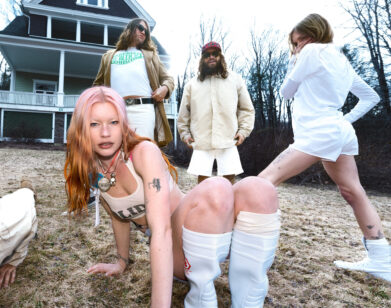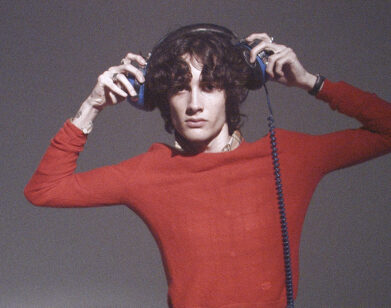Exclusive Song Premiere and Interview: ‘RICO (Jez Kerr A Certain Ratio Mix),’ Dinowalrus

ABOVE: DINOWALRUS. IMAGE COURTESY OF JACKIE ROMAN
Over the past five years, frontman Peter Feigenbaum has remained the constant guiding force behind the Brooklyn band Dinowalrus. For the band’s sophomore record, Best Behavior, Dinowalrus has replaced the sprawling no-wave of their first album, %, with the house beats and big hooks of the Manchester dance scene of the ’80s, often referred to as “Madchester.” As if to fully commit to the era of acid house, Dinowalrus asked Jez Kerr, bassist and vocalist of Manchester band A Certain Ratio, to remix their track “RICO,” Best Behavior‘s pulsating, Day-Glo centerpiece.
Before talking to Feigenbaum, Interview asked Kerr what he thought of Dinowalrus’ appreciation of a musical style that he helped create. “It’s flattering to have a band cite you as an influence on their music. It’s not something you set out to do,” Kerr said. While Kerr may have actually lived the music that Dinowalrus have drawn so heavily from, Feigenbaum has done an amazingly thorough job of internalizing Madchester’s history. Below, find our conversation with Feigenbaum, which touches on Twitter, the influence of A Certain Ratio, and the role of nostalgia in Dinowalrus’ music. You can also find an exclusive premiere of Kerr’s remix of “RICO.”

NATHAN REESE: Correct me if I’m wrong, but I think “RICO” may be the first dance track to reference federal indictment laws. What was the inspiration behind the song?
PETER FEIGENBAUM: Everything we write is pretty dark, lyrically, even if the music itself is sprightly and upbeat. I was watching a lot of The Sopranos at the time, and Tony was like [in a mobster accent] “They’re gonna hit me with a fuckin’ RICO!” Let’s just say that “RICO” has a vague Machiavellian element, with a hot house beat.
REESE: “Vaguely Machiavellian” seems like the right vibe for a warehouse party—
FEIGENBAUM:—Well, Tupac would agree!
REESE: So, how did Jez Kerr come to remix the track?
FEIGENBAUM: It came about through Twitter. It was about a month after we had recorded “RICO.” We got our friend David Kant to play sax on the track. He hasn’t lived in New York for a few years, but we always send him tracks and ask if he can play in the style of Steve Mackay or Andy Mackay—I forget who is who, but one of them is the sax player for Roxy Music and one of them was the sax player for The Stooges. In the process, I think I tweeted that a particular A Certain Ratio track was the best use of sax I’d heard in a long time.
REESE: What track was that?
FEIGENBAUM: I don’t remember, but it’s an old track that I somehow had just stumbled across. It was probably on I’d Like to See You Again. Then maybe Jez tweeted back and was like, “Thanks!” Long story short, we DM’d Jez and were like, “Do you do remixes?” and he was like, “We kinda do.” So we got some stems together and sent them over.
REESE: Listening to the remix, what are your thoughts on hearing Jez’s version of the track?
FEIGENBAUM: It’s always nice to hear our music in the hands of someone who is extremely talented and on another level. Just to hear our work reach a higher plane of awesomeness or intricacy is really thrilling. Any iterative process is sort of like a “choose your own adventure” scenario, where the song could end up a number of different ways. It’s cool pulling these “what ifs” back out of the closet and have someone with a different perspective explore them and come up with something that’s even better and has elements we never even would have thought of.
REESE: What was your past experience like with dance music or rave culture in general?
FEIGENBAUM: I hated it! When I was a kid, I listened to Nirvana, Black Flag, Sonic Youth, Germs, Meat Puppets—noisy American guitar bands. I had no interest in anything electronic or dance related—I just wanted to thrash! Slowly over the years, my tastes got more electronic, starting with Hawkwind, Suicide, and Spacemen 3. Eventually, I found my way into full-on acid house and rave music by way of Primal Scream’s Screamadelica. “RICO” was really the first time Dinowalrus attempted to make a full-on, serious dance track.
REESE: You’ve mentioned that your new album Best Behavior is inspired by the ’80s Madchester scene and Factory Records bands. How does A Certain Ratio in particular fit into that group of influences?
FEIGENBAUM: A Certain Ratio were from an earlier era. They were sort of like Factory Records 1.0. Jez knows the real story, but my understanding is that they first made their mark around the ’78 to ’82 period, with Joy Division and The Durutti Column—they were part of that first wave. But then they evolved. They were bringing funk and Afropop into that cold, angular, post-punk idiom, anticipating what would be coming down the pike later in the ’80s with Madchester and acid house.
REESE: So even though they predated acid house, they were using the sounds that were associated with those later bands.
FEIGENBAUM: They were very much a band ahead of their time. And I think their albums in the later ’80s, like acr:mcr, which I’ve listened to a lot, were almost like acid house or club records. Their production just kept getting better and better, too. Anyway, overall, I think our band has always been interested in ‘80s underground dance and post-punk music, and A Certain Ratio had a very important role in that. So, it’s great to connect ourselves to one of the bands that influenced us. We were also inspired by the RVNG FRKWYS series as well, in which past and present collide in cool ways.
REESE: It’s been a long time since A Certain Ratio recorded the music you’re talking about. How do you see Dinowalrus fitting into that narrative?
FEIGENBAUM: At this point, I don’t really know what times we’re living in musically, but we are all huge record collectors and students of pop music history. I thrive off of finding these uncanny intersections of style and culture from the past and exploiting them, and using them as ways to move forward. I think A Certain Ratio’s innovations and music are still very relevant in today’s musical climate. I mean, just ask The Rapture or James Murphy. I wanted to insert ourselves into that whole thread.
REESE: Aside from these Manchester bands, are there other sounds you’d be interested in incorporating?
FEIGENBAUM: I’ve gotten so bored with American music, especially historically. Though, hip-hop is still pretty wide open to me. I’m really into everything G-funk—digging deep for stuff like Twinz and Above The Law. And there are a lot of similarities between G-funk and Madchester. What really blew my mind was this Happy Mondays remix called “W.F.L.” that Paul Oakenfold did in like ’88 or something, and the second half is this break beat that’s sampled from N.W.A.’s “Express Yourself.”
Our contribution to music might be the unique way that we find these liminal zones between genres and exploit or reinvent them. But yes, there will definitely be this perpetual evolution of style and influences in our band. We’re already shifting a bit towards goth-y, majestic New Wave stuff like The Church, Cocteau Twins, Simple Minds, and Echo and the Bunnymen.
REESE: With all the attention you pay to past scenes and influences, how do you avoid pastiche when you’re making your own music?
FEIGENBAUM: I don’t know that we’ve avoiding falling into the trap of pastiche, and to be honest, some of my favorite bands are extremely pastiche-y, like Primal Scream, Royal Trux, Ariel Pink, and Trans Am. Pastiche has become a widely accepted aesthetic in the fine art world—maybe Richard Prince or Julian Schnabel are prime examples. So I don’t see why it can’t be a valid approach in the music world, too. I mean, in this day and age, what is “authenticity” anyway?
REESE: Do you worry about being seen as a revivalist?
FEIGENBAUM: I think Dinowalrus trafficks in historical references and puts them together in unexpected ways. We dig deep into the past and bring it to the present so you don’t have to—like museum curators or something! [laughs] But we aren’t interested in giving people a history lesson—it’s more like if we stumble across something from the past that we think would fit in especially well to the current and future state of pop music, we will use it.
A couple years ago, there were all these C86-influenced bands that broke through in a major way, like The Pains of Being Pure at Heart and Wild Nothing. I had this bizarre theory that [Manchester dance music genre] baggy was going to be the next big thing and we were going to spearhead that movement. The real reason that stylistic shifts happened for us is because they were already elements we were working with, like wah-guitar, analog synth pads, Farfisa organ, drum machine loops, and house-y mid-tempo beats.
REESE: When you’re making music, do you consciously think about how you’ll be remembered in the long run?
FEIGENBAUM: I have no expectation that we will be remembered, even though it’s probably why I started doing this. Unfortunately, I just assume that all bands today are going to be forgotten in a couple years. There’s just this over-saturation of bands, and all the major stylistic leaps and gains in the medium have already been achieved long ago. I guess that’s what I’ve learned from doing this a while. So, really, we’re just doing this to have fun and hopefully give some people some short-term enjoyment.
DINOWALRUS’ SOPHOMORE ALBUM BEST BEHAVIOR IS OUT NOW. THEY PLAY MERCURY LOUNGE ON JUNE 12. FOR MORE INFORMATION ON THE ARTIST, PLEASE VISIT THEIR WEBSITE.






